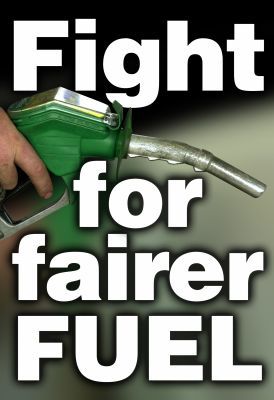Politicians, business owners and drivers made a final plea to Chancellor George Osborne to take decisive action on rocketing fuel prices when he delivers his Budget today.
It is widely believed Mr Osborne will postpone a planned rise in fuel duty scheduled for April 1, but he is also being urged to implement a fuel duty regulator to find a long-term solution to the problem.
The Budget comes as prices at the pumps have reached new record highs, with diesel passing the 140p a litre mark for the first time according to the AA.
The average cost of petrol is now 133.46p a litre, with diesel at 140.01p a litre.
Drivers were paying 116.71p a litre for petrol and 117.42p for diesel only a year ago.
The Courier has been campaigning for fairer fuel prices and delivered a petition signed by more than 10,000 readers to Downing Street urging action earlier this month.
AA president Edmund King said, “A 10p rise in the pump price of diesel since the start of the year, equivalent to an extra £5 for even the smallest of tanks, is a staggering extra burden on private and business drivers.
“Millions are desperate for the chancellor to provide some relief through shelving the fuel duty increase scheduled for April 1.
“What clearer signal does the chancellor need that action is needed now? Today’s record fuel prices say it all.”
Meanwhile, the Federation of Small Businesses also called for action.
“Reversing the planned 1p rise and cutting VAT on fuel duty in the budget will be welcome steps,” said policy convener Andy Willox.
“But to really stem these volatile prices the government must introduce a fuel duty stabiliser as it promised.”
Scotland’s finance secretary John Swinney has outlined three key elements he believes should be included in the Budget to secure the country’s economic recovery.
He said action on fuel prices, increased investment in capital projects and measures to improve access to finance for business are vital.
In Dundee, video games companies will also be closely monitoring the Budget for any announcement on tax breaks for the industry.
The previous Labour administration at Westminster had promised to bring the UK into line with rival countries such as Canada by offering incentives to firms to base their business here.
However, the policy was never implemented and Mr Osborne ruled out taking action in his emergency Budget in June.
Trade organisation TIGA has been extensively lobbying for tax breaks since then and it hoped the chancellor will reveal a change of heart today.
Other measures likely to be unveiled include a measure to impose air passenger duty on private jets.
The move is expected to cost executive flyers tens of million of pounds each year and is designed to show that the wealthy are also suffering from the Conservative-led Government’s austerity measures.
It will come alongside a freezing of the duty paid by holidaymakers for flights abroad, but will probably not be implemented for a least a year while a consultation is carried out on how to apply it and what the rate should be.
Mr Osborne will also outline details of a clampdown on tax avoidance which he hopes will net the Treasury an extra £4 billion over the next four years.
He has vowed that there will be no more tax rises or spending cuts in today’s statement, which will instead set out a package of measures designed to boost growth and jobs.
There has also been speculation he may scrap income tax on those earning less than £8000 after he confirmed thresholds will be raised in real terms.
He is also expected to extend the Support for Mortgage Interest scheme introduced under Labour for a further year, helping an estimated 100,000 households avoid repossession.
The scheme, which had been due to end at the start of 2012, offers support for home-owners struggling with mortgage repayment due to unemployment.
